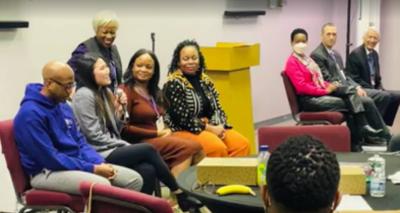Three Reflections on a “Heeding King’s Call” Event

Photo by Elethia Singletary for the Heeding King's Call event. Used with permission.
Brenda Girton-Mitchell, Ending Racism USA founding executive director, standing on left; Ken Bedell, president of Ending Racism USA, seated on far right.
On Saturday, January 6, 2024, Grace and Race Ministries, Inc. sponsored a “Heeding King’s Call” event at the Metropolitan Baptist Church in Largo, Maryland. The event was co-sponsored by Ending Racism USA.
The theme was “What have you done for the dream lately?” Dr. Joshua Wright gave the keynote address. He is an excellent teacher and Associate Professor of History and Global Affairs at Trinity Washington University. Wright presented a realistic picture of Martin Luther King Jr.’s work during his lifetime. He recounted the core of King’s teachings and reviewed his impact on American society while he lived and since his assassination.
There were six panelists, including myself. Each panelist spoke about their passion and the opportunity to work for justice. King’s inspiration played an important role for each.
The panelists were:
- Eden Cho, an education technologist at the Smithsonian Institute
- Gregory Dwyer, a talent development consultant and facilitator
- Teya Green, a teacher in the District of Columbia Public Schools
- Rev. Aleisha Langhorne, the pastor at the Luther Rice Memorial Church and an author
- Rhonda Mower, the senior vice president of diversity, equity and inclusion at the National Office of Volunteers of America
- Ken Bedell, president of Ending Racism USA
I came away with three reflections. First is the part of King’s inspiration that is obvious in the respondents’ lives. Except for myself, all the panelists were born after King’s assassination. There was diversity in their areas of vocational choice. With the exception of Rhonda Mower who has a job of promoting diversity, equity and inclusion, all of the panelists have job titles that do not require them to work for justice. Yet, I heard a common theme. They are all breaking down barriers so that Black Americans can participate fully in American society. They are not just taking advantage of opportunities they have, but they are encouraging and supporting others. You could say that they are blooming where they have planted themselves.
The generations born after King died are both the products and promoters of the dream. As Wright explained to me during a debriefing of the event, “There has been progress.” I asked, “How so?” He pointed out how his grandparents had limited educational opportunities, and his parents’ career options were somewhat circumscribed. Also, the civil rights legislation expanded voting and other rights. I understood. However, this caused me to reflect on the other side of the coin.
In his keynote address, Wright talked about three pillars of King’s dream for America. They are economic and social justice, nonviolence, and establishing a beloved
community. The other side of the coin is ending militarism. Wright pointed out there is still a great deal of work to be done to fulfill the dream of eliminating inequities and ending discrimination, including skin color discrimination, so all children (and adults) are only judged “by the quality of their character.” However, we have done little to address militarism since King was assassinated. Today, the United States spends about $877 billion on the military, yet when adjusted for inflation, this amount is slightly more than the military expenditure in wartime 1968.
Today, King’s dream that the United States will lead the world by offering nonviolent solutions to international disagreements, and even international aggressions is either forgotten or ignored by most Americans. Often, Americans who are committed to and working for racial justice give little attention to King’s call for an end to militarism. The nonviolent domestic social action strategy is part of discussions of ending racism. Addressing police violence is also on the agenda, but facing the foundation of militarism in American society is usually ignored.
All of this caused me to reflect on the lottery slogan, you can’t win if you don’t play. Challenging Americans to address militarism in the same way that anti-racists challenge Americans to address inequities is difficult and takes courage. As Wright pointed out, King was severely criticized for his opposition to the Vietnam War. Some people argued that he was doing harm to the civil rights movement by his stance against militarism.
Wright speaks boldly and honestly about King’s life and his message for today. His is an important message because there are two sides to the coin, blooming where we plant ourselves and working to end militarism. If we choose to ignore any of the pillars of King’s dream, then the whole structure falls and we cannot reach the goal of becoming a beloved community.
